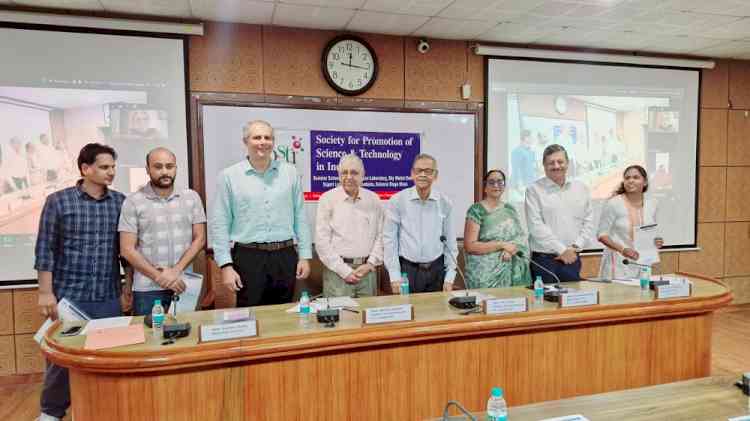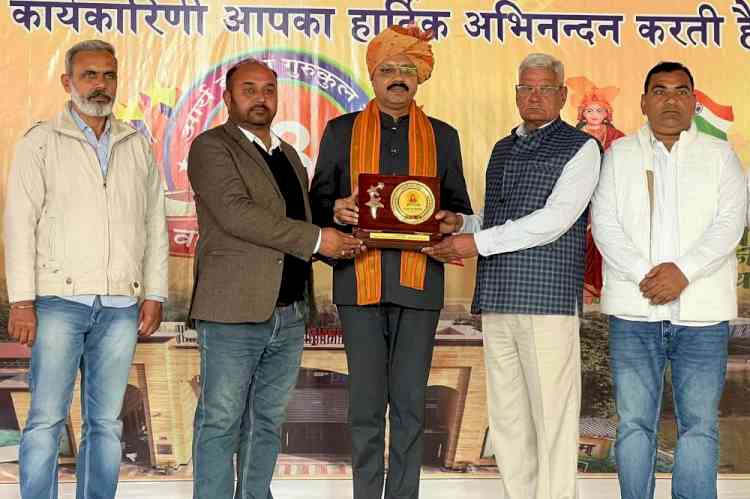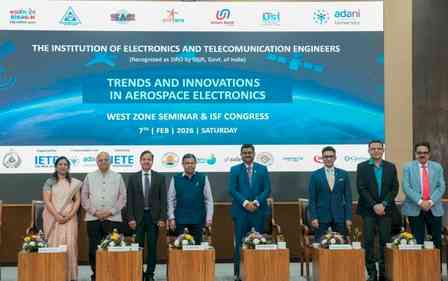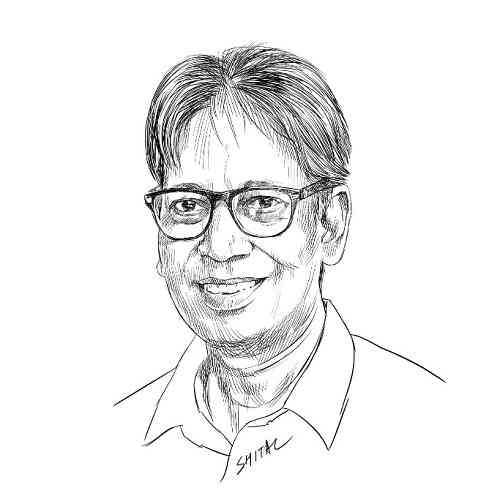Lecture on “Homi Bhabha’s Legacy as a Teacher-Scientist and Institution Builder in Independent India”
The Society for Promotion of Science & Technology in India (SPSTI), in association with Sophisticated Analytical Instrumentation Facility (SAIF), Panjab University, Chandigarh, Chandigarh Chapters of NASI, INSA & INYAS, CRIKC, and Amity University Punjab, Mohali, organized a special Teachers’ Day Lecture at the Seminar Room, Central Instrumentation Facility, SAIF, Panjab University, Chandigarh. The event was supported by the Department of Science, Technology & Environment, Chandigarh Administration.

Chandigarh, September 9, 2025: The Society for Promotion of Science & Technology in India (SPSTI), in association with Sophisticated Analytical Instrumentation Facility (SAIF), Panjab University, Chandigarh, Chandigarh Chapters of NASI, INSA & INYAS, CRIKC, and Amity University Punjab, Mohali, organized a special Teachers’ Day Lecture at the Seminar Room, Central Instrumentation Facility, SAIF, Panjab University, Chandigarh. The event was supported by the Department of Science, Technology & Environment, Chandigarh Administration.
The distinguished lecture was delivered by Prof. Arun Kumar Grover, FASc, FNASc, Honorary Professor, PEC Chandigarh, Former Vice Chancellor, Panjab University, and Vice President, SPSTI.
Highlights of the Lecture
Prof. Grover spoke on “Homi Bhabha’s Legacy as a Teacher-Scientist and Institution Builder in Independent India”, tracing the journey of Dr. Homi Jehangir Bhabha (1909–1966) from his early academic brilliance at Cambridge University to his pivotal role in shaping India’s scientific institutions.
He recalled how Bhabha, after initial work in cosmic ray physics at Cambridge, chose to remain in India during World War II and joined the Indian Institute of Science, Bangalore, under Nobel Laureate C.V. Raman. It was here that he initiated cosmic ray experiments and began nurturing young Indian scientists.
Prof. Grover emphasised that Bhabha’s vision went far beyond his personal research. His landmark proposal to the Sir Dorabji Tata Trust in 1944 led to the establishment of the Tata Institute of Fundamental Research (TIFR) in Mumbai, which became a cradle of modern scientific research in India. With the support of J.R.D. Tata, S.S. Bhatnagar, and Prime Minister Jawaharlal Nehru, Bhabha created a new generation of Indian physicists, mathematicians, and engineers who went on to shape India’s progress.
The lecture also highlighted Bhabha’s leadership of India’s Atomic Energy Programme. As the first Chairman of the Atomic Energy Commission, he oversaw the creation of the Atomic Energy Establishment, Trombay (AEET)—later renamed the Bhabha Atomic Research Centre (BARC). Under his stewardship, India built its first research reactor APSARA (1956) and soon after, the CIRUS reactor (1960) in collaboration with Canada. His visionary Three-Stage Nuclear Power Programme, based on India’s abundant thorium reserves, continues to guide India’s nuclear energy policy.
Prof. Grover underlined Bhabha’s multidimensional contributions:
• Electronics & Defense – Recognizing electronics as a strategic sector, Bhabha set up the Electronics Corporation of India Limited (ECIL) in 1967.
• Space Programme – In 1962, he co-opted Dr. Vikram Sarabhai into the Atomic Energy Commission, paving the way for the creation of INCOSPAR and later ISRO.
• Cancer Research & Biology – He integrated Tata Memorial Hospital into the Department of Atomic Energy, initiated a Biology Unit in 1948, and promoted molecular biology and radio astronomy research.
• International Standing – Bhabha chaired the historic First International Conference on the Peaceful Uses of Atomic Energy (Geneva, 1955) and was a permanent member of the IAEA Scientific Advisory Committee.
Prof. Grover also reminded the audience that Bhabha was nominated five times for the Nobel Prize in Physics for his pioneering work on cosmic rays and “Bhabha Scattering.” He left behind not only institutions of excellence but also a blueprint for India’s self-reliant scientific development.
Dignitaries and Programme
The event was graced by eminent academicians:
• Chief Guest:Prof. K. N. Pathak, FNA, FASc, FNASc, Former Vice Chancellor, Panjab University, Chandigarh
• Guest of Honour:Prof. Meenakshi Goyal, Director, R & D Cell, Panjab University, Chandigarh
The programme began with a welcome address by Prof. Gaurav Verma, Director, SAIF, followed by addresses from the Chief Guest and Guest of Honour. Two employees of the Central Instrumentation Laboratory (CIL) were honoured on the occasion for their services.
The speaker was formally introduced by Prof. Rajat Sandhir, Panjab University. The programme concluded with a vote of thanks by Sh. Dharam Vir, IAS (Retd.), President, SPSTI.



 City Air News
City Air News 










